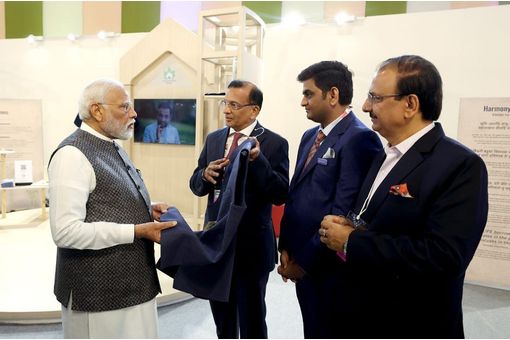Interviews
News Flash
Lenzing reveals 2021 sustainability trends impacting fashion landscape
22 Mar '21
3 min read

Pic: Tencel
Lenzing has revealed the top three sustainability trends impacting the fashion landscape in 2021. According to consumer preferences, 2021 will be a pivotal year for the fashion industry as emerging technologies lay the foundation for a more sustainable future. Lenzing produces wood-based viscose fibres, modal fibres, lyocell fibres, and filament yarn.
Consumers continue to seek ways to become better informed and make eco-conscious purchases. As a result, eco-friendly brands are creating products that consumers can feel comfortable in purchasing. In addition, brands are also publishing their environmental credentials and eco-friendly initiatives to help consumers keep them accountable for their progress toward sustainability. Eco-conscious brands are actively driving sustainable changes as compared to some fast fashion and luxury brands who are lagging behind or still distancing themselves from the conversation, Lenzing said.
The 2021 Fossil Fashion Report revealed many consumers remain unaware that cheap fibres like polyester are found in over half of all textiles and account for 530 million tonnes of carbon emissions, indicating brands must continue raising awareness, and decreasing their reliance on cheap synthetics. The rise of fast fashion has correlated with the widespread availability of cut-price fossil-fuel-based fibres like polyester. Polyester is incredibly energy-exhaustive to produce, equating to six times the carbon emissions of cotton, according to the 2021 Fossil Fashion Report.
The report also revealed polyester production alone in 2015 was responsible for over 700 million tons of carbon emissions and efforts to recycle these items remain lacking. Currently, just 1 per cent of clothing is recycled and even when using recycled polyester, raw materials used are often plastic bottles, not textiles. These are worrying figures; however, the global health crisis has pressed reset on the world’s appetite for fast fashion. Many conscious consumers are opting out of fast fashion in favour of ‘slow fashion’, where fewer clothes are consumed and are expected to last far longer, , Lenzing said in a press release.
An urgent need to rethink the industry’s carbon output has encouraged brands to double down on efforts to innovate, increasing demand for alternatives to synthetics, like sustainable plant-based fibres which provide comfort and durability alongside sustainability guarantees. These innovations also include the development of ground-breaking circularity-minded processes to reuse water and solvents during production. While some emissions remain unavoidable at present, these innovations will also assist with a largescale push away from impactful production practices in the years to come, according to Lenzing.
By reducing the environmental impact of garments at the production stage, carbon emissions will be drastically reduced throughout its lifestyle and costly investments in recycling technology can occur in a phased approach that is workable for the entire industry. To make a carbon-free future a reality, brands must increase awareness about the environmental burden that fibres like polyester place on the environment. Additionally, brands must urgently implement alternatives to cheap synthetics and further promote and support sustainable production processes. The changes brands make now will pave the way for a brighter future.
The Tencel brand remains committed to sustainability-oriented innovation. With the introduction of next-generation carbon-zero Tencel branded lyocell and modal fibres and Lenzing’s ambitious carbon-zero vision for 2050. This core focus will see new industry leading innovations announced throughout 2021 to support the fashion and textiles industry throughout its journey toward complete sustainability.
Consumers continue to seek ways to become better informed and make eco-conscious purchases. As a result, eco-friendly brands are creating products that consumers can feel comfortable in purchasing. In addition, brands are also publishing their environmental credentials and eco-friendly initiatives to help consumers keep them accountable for their progress toward sustainability. Eco-conscious brands are actively driving sustainable changes as compared to some fast fashion and luxury brands who are lagging behind or still distancing themselves from the conversation, Lenzing said.
The 2021 Fossil Fashion Report revealed many consumers remain unaware that cheap fibres like polyester are found in over half of all textiles and account for 530 million tonnes of carbon emissions, indicating brands must continue raising awareness, and decreasing their reliance on cheap synthetics. The rise of fast fashion has correlated with the widespread availability of cut-price fossil-fuel-based fibres like polyester. Polyester is incredibly energy-exhaustive to produce, equating to six times the carbon emissions of cotton, according to the 2021 Fossil Fashion Report.
The report also revealed polyester production alone in 2015 was responsible for over 700 million tons of carbon emissions and efforts to recycle these items remain lacking. Currently, just 1 per cent of clothing is recycled and even when using recycled polyester, raw materials used are often plastic bottles, not textiles. These are worrying figures; however, the global health crisis has pressed reset on the world’s appetite for fast fashion. Many conscious consumers are opting out of fast fashion in favour of ‘slow fashion’, where fewer clothes are consumed and are expected to last far longer, , Lenzing said in a press release.
An urgent need to rethink the industry’s carbon output has encouraged brands to double down on efforts to innovate, increasing demand for alternatives to synthetics, like sustainable plant-based fibres which provide comfort and durability alongside sustainability guarantees. These innovations also include the development of ground-breaking circularity-minded processes to reuse water and solvents during production. While some emissions remain unavoidable at present, these innovations will also assist with a largescale push away from impactful production practices in the years to come, according to Lenzing.
By reducing the environmental impact of garments at the production stage, carbon emissions will be drastically reduced throughout its lifestyle and costly investments in recycling technology can occur in a phased approach that is workable for the entire industry. To make a carbon-free future a reality, brands must increase awareness about the environmental burden that fibres like polyester place on the environment. Additionally, brands must urgently implement alternatives to cheap synthetics and further promote and support sustainable production processes. The changes brands make now will pave the way for a brighter future.
The Tencel brand remains committed to sustainability-oriented innovation. With the introduction of next-generation carbon-zero Tencel branded lyocell and modal fibres and Lenzing’s ambitious carbon-zero vision for 2050. This core focus will see new industry leading innovations announced throughout 2021 to support the fashion and textiles industry throughout its journey toward complete sustainability.
Fibre2Fashion News Desk (GK)
Popular News
Leave your Comments
Editor’s Pick
































-Ltd..jpg?tr=w-120,h-60,c-at_max,cm-pad_resize,bg-ffffff)





.jpg?tr=w-120,h-60,c-at_max,cm-pad_resize,bg-ffffff)
.jpg?tr=w-120,h-60,c-at_max,cm-pad_resize,bg-ffffff)






